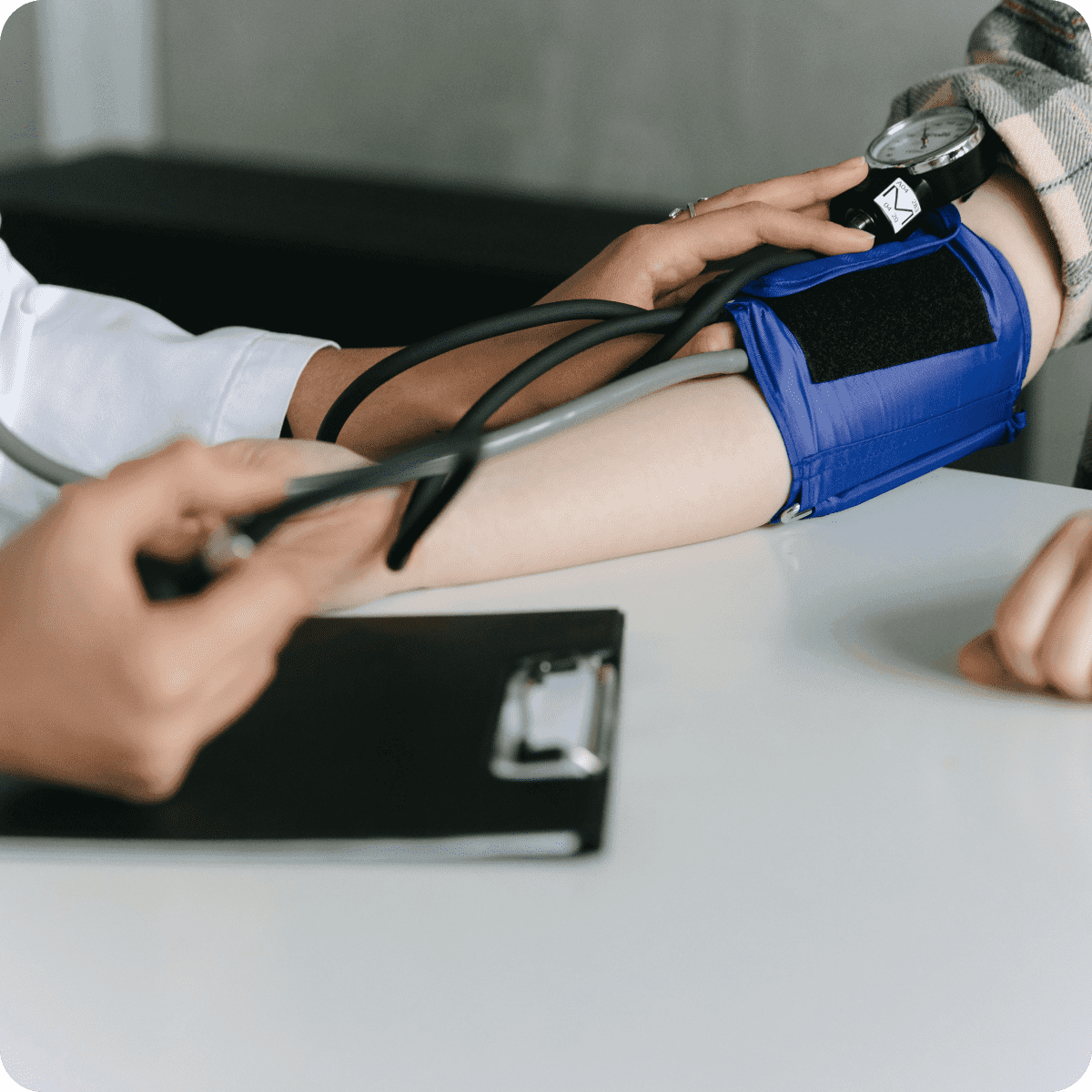Menopause is a natural biological process that marks the end of a woman's reproductive years. It typically occurs in the late 40s or early 50s and brings about changes in hormone levels that can impact various organs and functions in the body. This is why menopause symptoms range from hot flushes to brain fog and dry skin to altered bowel habits.
The hormonal changes that occur during menopause can also impact cardiovascular health. It’s important to be aware of the risks and understand the steps you can take to look after your heart to ensure that you feel your best during this transitional life stage and beyond.
Can menopause cause heart problems?
The hormonal changes associated with menopause can increase your risk of heart disease and stroke. Oestrogen, which has a protective effect on the cardiovascular system, declines during this time, affecting blood vessels, cholesterol levels and insulin resistance.Oestrogen helps to maintain healthy blood vessels by regulating cholesterol levels and reducing fat buildup in the arteries. As oestrogen levels decline during menopause, women may experience an increase in cardiovascular risk factors.
The risk of heart disease and stroke tends to rise after menopause, and women may catch up with men in terms of cardiovascular risk. Women who reach menopause, either naturally or surgically, before age 45 have a higher risk of coronary heart disease because there’s less oestrogen in the body from an earlier age.
How does menopause impact cardiovascular health?
Declining oestrogen during menopause affects the entire body and as such, changes can occur that contribute to the increased risk of cardiovascular disease:
Changes in lipid profiles
Menopause is associated with changes in lipid profiles. There is often an increase in total cholesterol, low-density lipoprotein (LDL or ‘bad’ cholesterol) and triglycerides whilst high-density lipoproteins (HDL or good cholesterol) falls.
LDLs are particles made of lipids (fats) and proteins that carry fats through your bloodstream. They contain a large amount of cholesterol and when there is an excess of cholesterol in the body, it can contribute to plaque buildup in your arteries. Plaque build-up can increase your risk of:
- Stroke
- Heart attack
- Coronary artery disease
- Cerebrovascular disease
- Peripheral artery disease
- Aortic aneurysm
Triglycerides are another type of blood fat. They are our main source of energy and are essential for your health but if you have too much in your blood they can increase your risk of heart disease and stroke.
Maintaining a healthy diet and lifestyle becomes particularly important during and after menopause to help manage lipid levels.
Changes in blood pressure
Up to 50% of women develop high blood pressure before the age of 60. Your blood pressure may increase during menopause due to hormonal changes and increased blood pressure is a risk factor for heart disease and stroke.
Regular monitoring of blood pressure and lifestyle modifications, such as a low-sodium diet and regular exercise can help.
Weight gain and metabolic changes
Many women experience weight gain during and after menopause, particularly around the abdominal area. This can contribute to metabolic changes and an increased risk of cardiovascular disease. Maintaining a healthy weight through diet and exercise is crucial for cardiovascular health.
Bone health and cardiovascular health connection
Osteoporosis, a condition characterised by weakened bones, is common in postmenopausal women. While not directly related to cardiovascular health, fractures from osteoporosis can lead to immobility, which may contribute to cardiovascular complications.
Lifestyle changes
During menopause, women are often navigating other challenging things in their life such as juggling a full-time job with caring responsibilities. This can result in higher levels of stress which in turn, can result in adopting unhealthier habits that can adversely impact heart health such as:
- Increased alcohol consumption
- Increased smoking
- Being more sedentary
- Eating more processed foods
Modifying these factors can reduce the risk of heart disease later on in life.
Metabolic syndrome
Metabolic syndrome is a cluster of conditions that increase the risk of heart disease. An individual meets the criteria for metabolic syndrome if they have at least three of the following:
- Excess abdominal weight
- High triglyceride levels
- Low high-density lipoprotein levels
- High blood pressure
- Elevates blood sugar levels
As menopause can lead to weight gain and health issues, it can increase the risk of metabolic syndrome, regardless of a woman’s age.
Menopause and heart attack symptoms
Some common symptoms of perimenopause and menopause may make you worry about your heart. For example,
- Heart palpitations – where your heart feels like it skips or flutters
- Rapid heartbeat
- Chest tightness
- Aches and pains, including in the chest area
- Anxiety
In most instances, these are likely to be caused by changing hormone levels. However, it’s important to rule out other underlying causes and be aware of the signs of something more serious.
A heart attack in a medical emergency that requires immediate treatment. Heart attack symptoms can vary but include:
- Chest pain - a sensation of pressure, tightness, heaviness or squeezing across your chest.
- Pain elsewhere in the body - it may spread down your left (or right) arm, into the jaw and neck, and across the back and stomach.
- Lightheadedness or dizziness
- Shortness of breath
- Nausea and/or vomiting
- Sweating
- Indigestion
- Coughing or wheezing
- Overwhelming anxiety (like a panic attack)
Hormone replacement therapy (HRT)
Hormone replacement therapy (HRT) is a treatment option that some women may consider for managing menopausal symptoms. However, the use of HRT for cardiovascular protection is a complex and evolving topic, and it involves weighing potential benefits against risks. The use of HRT solely for cardiovascular protection is not currently recommended by the British Menopause Society.
HRT and cardiovascular benefits
There is evidence that indicates that HRT can help reduce the risk of cardiovascular disease, particularly if started before the age of 60 or within 10 years of the onset of menopause. This is because HRT replaces the oestrogen that naturally declines in the body thus restoring its protective effects.
While the risks of HRT are largely outweighed by its benefits in the reduction of menopause symptoms, in the majority of women, some forms of HRT can slightly elevate the chances of other health problems such as breast cancer and gallbladder disease.
HRT and cardiovascular risks
Oral HRT (tablets) can slightly increase the risk of blood clots and stroke. The average occurrence of a blood clot, including a deep vein thrombosis or pulmonary embolism, is around 1 in every 1000 adults per year. For women taking oral HRT, studies suggest this doubles to 2 in 1000.
In the first year of taking oral HRT, the risk of stroke increases but research has found that the risk is comparable to non-HRT users after this.
How to take control of your heart health in menopause
- Maintain a healthy weight: A healthy body mass index for adults is between 18.5 and 24.9.
- Adopt a healthy diet: Embrace a heart-healthy diet rich in fruits, vegetables and whole grains.
- Take regular exercise: We recommend you engage in regular physical activity (at least 150 minutes of moderate activity per week).
- Manage stress through relaxation techniques such as mindfulness, meditation and yoga.
- Reduce alcohol consumption: The recommendation is less than 14 units per week.
- Have regular check-ups: Attend regular check-ups to monitor your blood pressure, cholesterol levels, and overall cardiovascular health.
- Stop smoking: Smoking is a significant risk factor for heart disease.
- Stay informed: Educate yourself about menopause and its impact on cardiovascular health. Being informed empowers you to make healthier choices.
How we can help you at Menopause Care
If you want to see a doctor for menopause symptoms or to discuss its wider impact on your overall health, Menopause Care is here to help. We offer a consultation with a specialist who knows and understands the nuances of menopause. All our doctors are also experienced in recognising and managing risk factors for cardiovascular disease.
We can refer you to another specialist, such as a cardiologist, or book you an appointment with our menopause dietician for nutritional guidance.
During your initial consultation, we’ll discuss your medical history, family history and lifestyle in depth to assess your individual risk and develop a plan you are happy with and understand.
We can arrange blood tests or scans to assess your overall health, including your cardiovascular risk and bone health and can liaise with your GP and any other specialists involved in your care.
We can talk you through the different forms of HRT and arrange for you to begin an HRT regimen as soon as possible to help you eliminate menopause symptoms. To get started, book a consultation with a menopause doctor.





